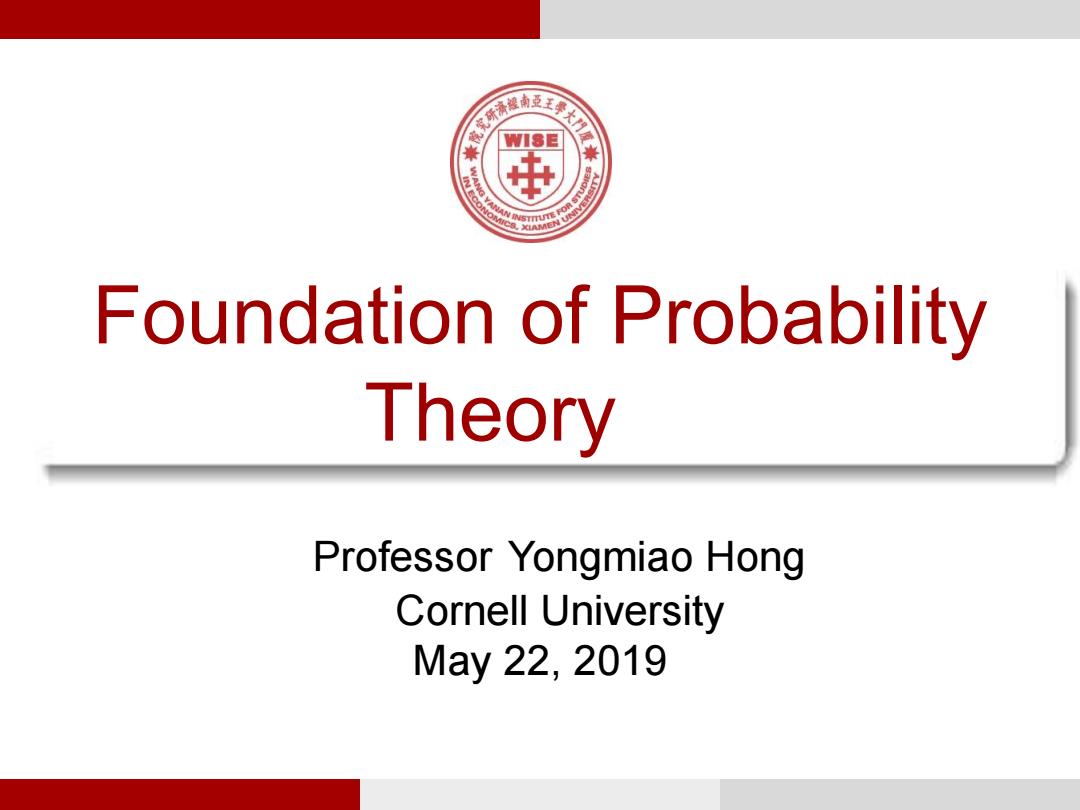
,院究所膏装南鱼王季大門厦鼻 NG YA Foundation of Probability Theory Professor Yongmiao Hong Cornell University May22,2019
Foundation of Probability Theory Professor Yongmiao Hong Cornell University May 22, 2019
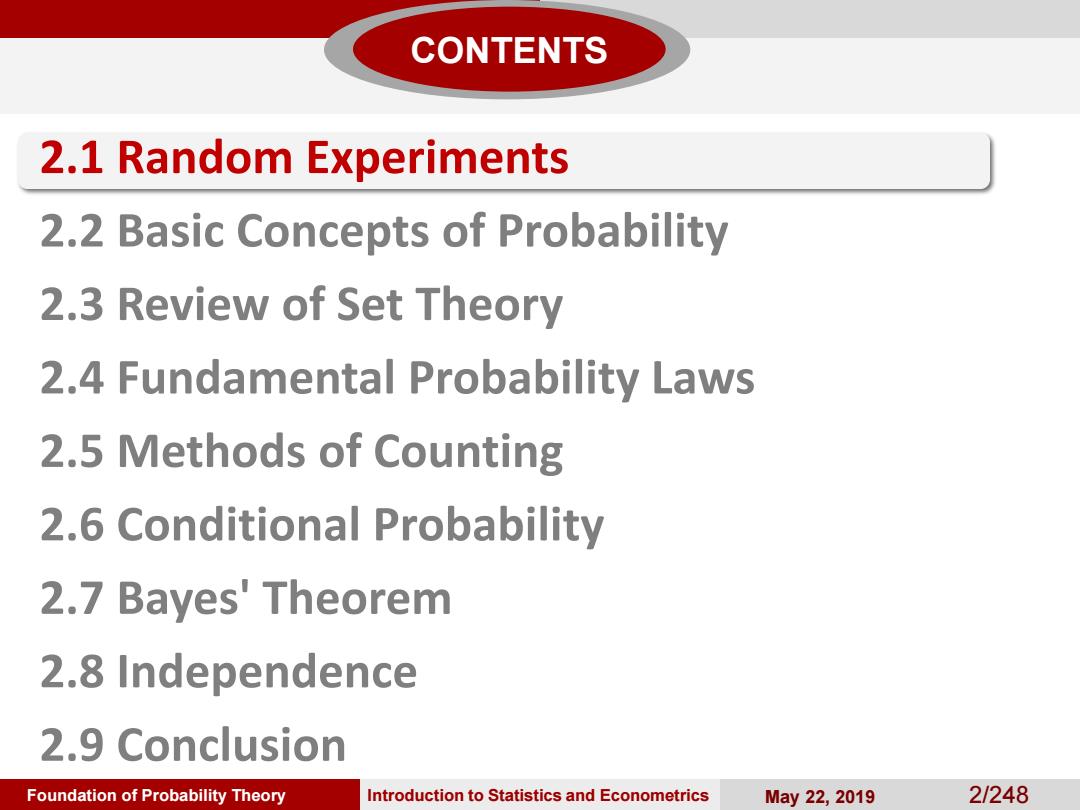
CONTENTS 2.1 Random Experiments 2.2 Basic Concepts of Probability 2.3 Review of Set Theory 2.4 Fundamental Probability Laws 2.5 Methods of Counting 2.6 Conditional Probability 2.7 Bayes'Theorem 2.8 Independence 2.9 Conclusion Foundation of Probability Theory Introduction to Statistics and Econometrics May22,2019 2/248
Foundation of Probability Theory Introduction to Statistics and Econometrics May 22, 2019 2/248 2.1 Random Experiments 2.2 Basic Concepts of Probability 2.3 Review of Set Theory 2.4 Fundamental Probability Laws 2.5 Methods of Counting 2.6 Conditional Probability 2.7 Bayes' Theorem 2.8 Independence 2.9 Conclusion CONTENTS
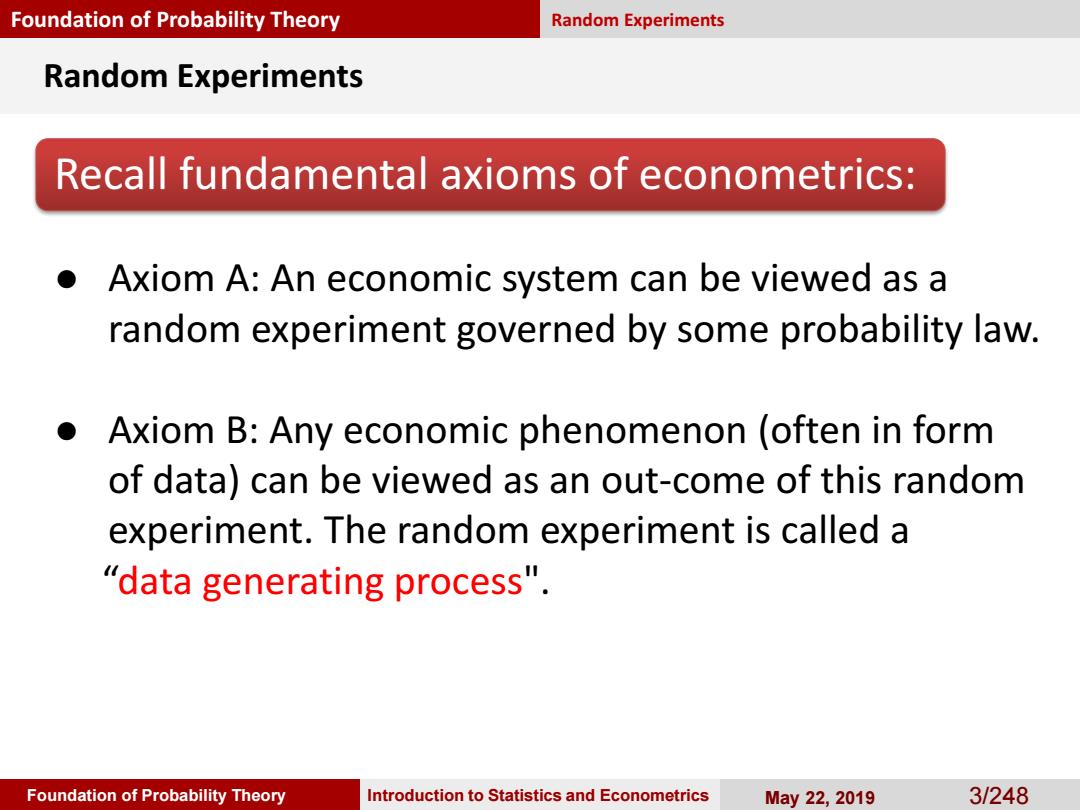
Foundation of Probability Theory Random Experiments Random Experiments Recall fundamental axioms of econometrics: Axiom A:An economic system can be viewed as a random experiment governed by some probability law. Axiom B:Any economic phenomenon (often in form of data)can be viewed as an out-come of this random experiment.The random experiment is called a "data generating process". Foundation of Probability Theory Introduction to Statistics and Econometrics May22,2019 3/248
Foundation of Probability Theory Introduction to Statistics and Econometrics May 22, 2019 3/248 Recall fundamental axioms of econometrics: ● Axiom A: An economic system can be viewed as a random experiment governed by some probability law. ● Axiom B: Any economic phenomenon (often in form of data) can be viewed as an out-come of this random experiment. The random experiment is called a “data generating process". Random Experiments Foundation of Probability Theory Random Experiments
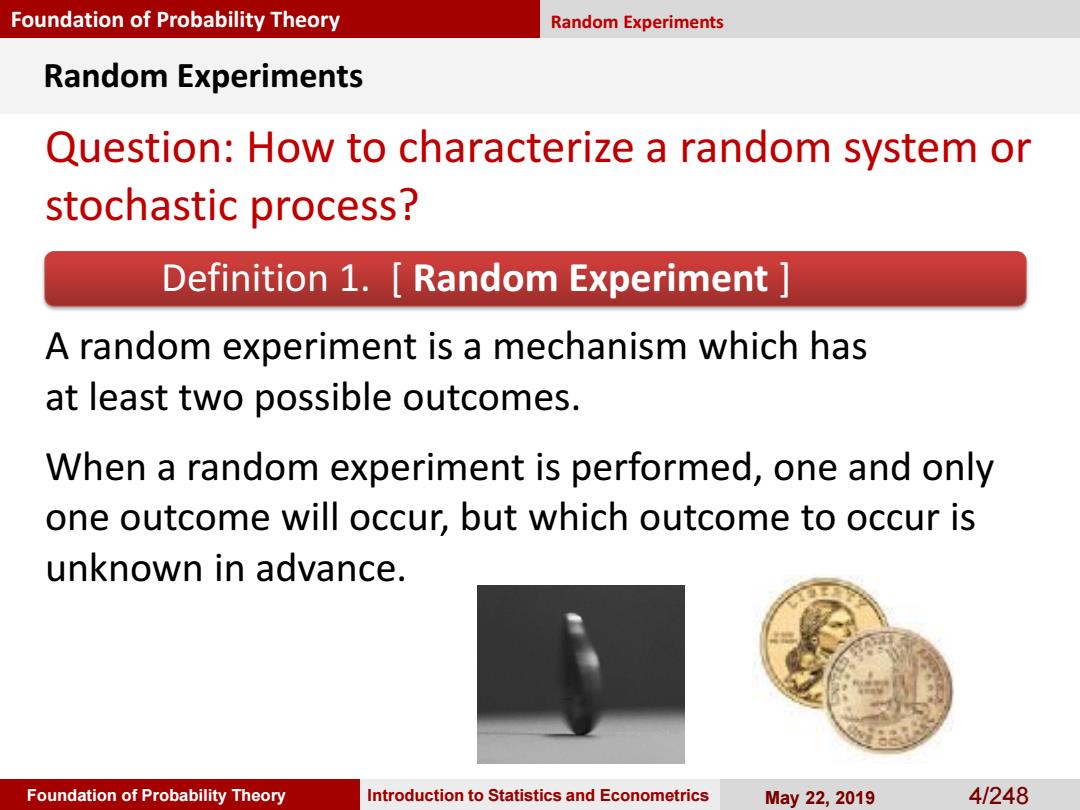
Foundation of Probability Theory Random Experiments Random Experiments Question:How to characterize a random system or stochastic process? Definition 1.Random Experiment A random experiment is a mechanism which has at least two possible outcomes. When a random experiment is performed,one and only one outcome will occur,but which outcome to occur is unknown in advance. Foundation of Probability Theory Introduction to Statistics and Econometrics May22,2019 4/248
Foundation of Probability Theory Introduction to Statistics and Econometrics May 22, 2019 4/248 Random Experiments Random Experiments Question: How to characterize a random system or stochastic process? Definition 1. [ Random Experiment ] A random experiment is a mechanism which has at least two possible outcomes. When a random experiment is performed, one and only one outcome will occur, but which outcome to occur is unknown in advance. Foundation of Probability Theory
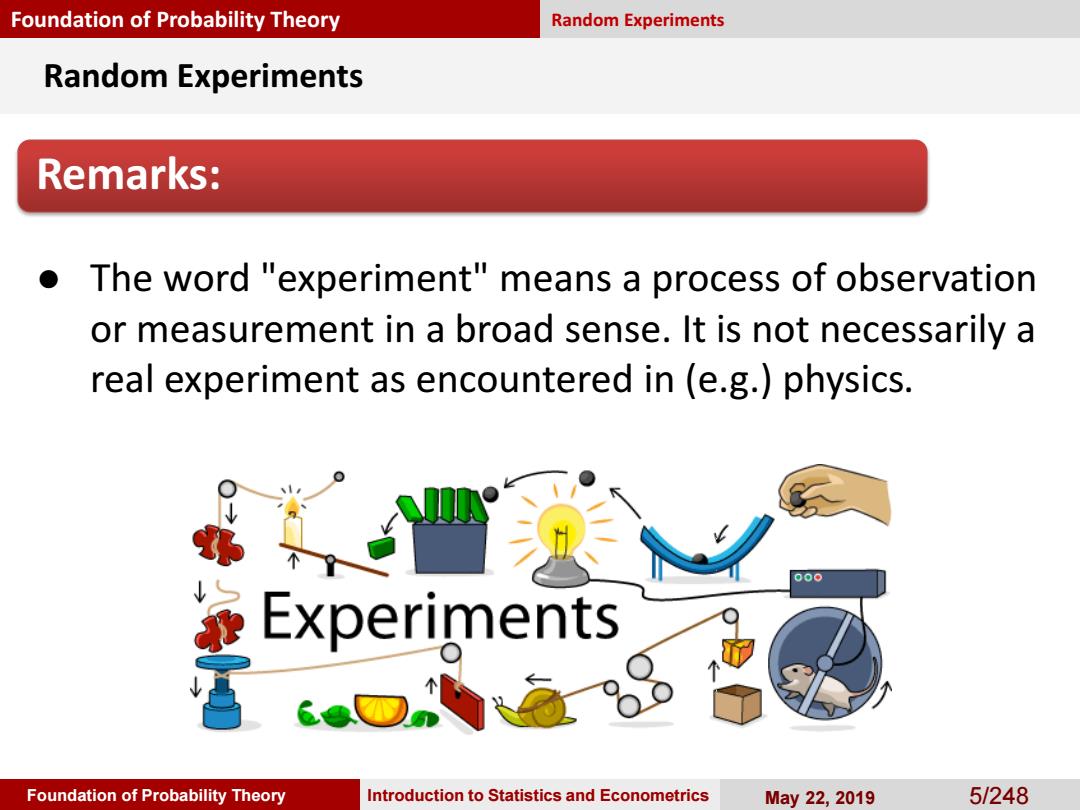
Foundation of Probability Theory Random Experiments Random Experiments Remarks: The word "experiment"means a process of observation or measurement in a broad sense.It is not necessarily a real experiment as encountered in (e.g.)physics. 000 Experiments Foundation of Probability Theory Introduction to Statistics and Econometrics May22,2019 5/248
Foundation of Probability Theory Introduction to Statistics and Econometrics May 22, 2019 5/248 Remarks: ● The word "experiment" means a process of observation or measurement in a broad sense. It is not necessarily a real experiment as encountered in (e.g.) physics. Random Experiments Foundation of Probability Theory Random Experiments
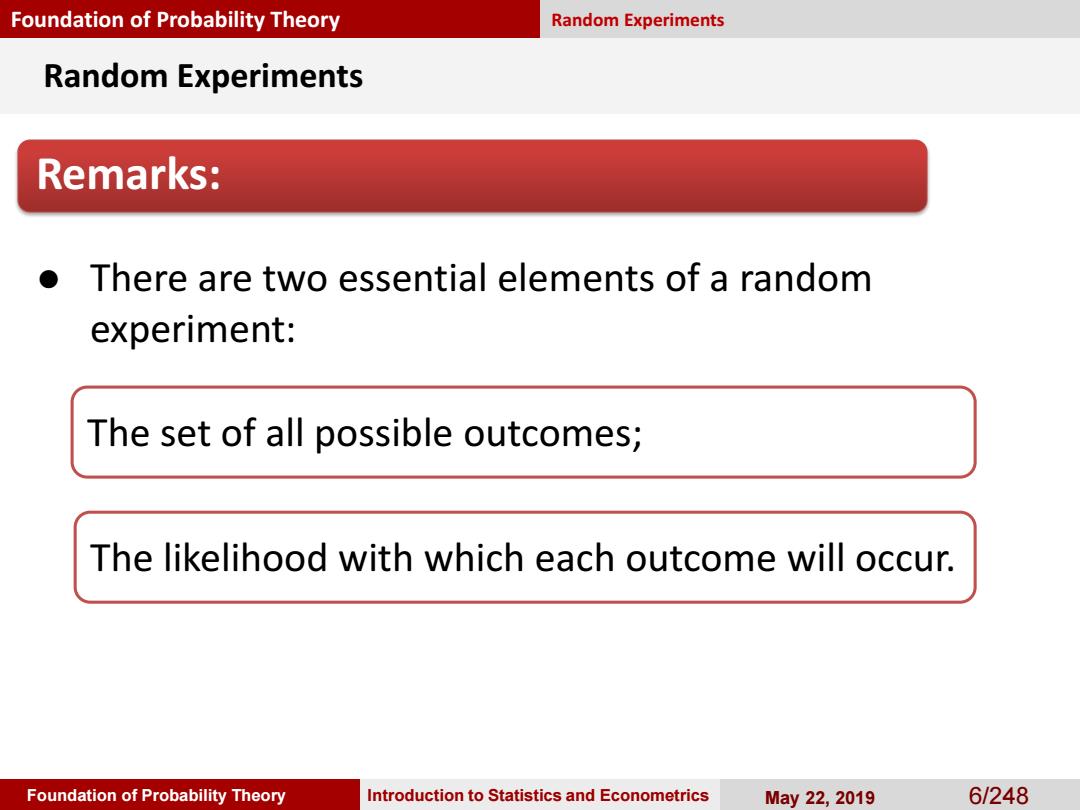
Foundation of Probability Theory Random Experiments Random Experiments Remarks: There are two essential elements of a random experiment: The set of all possible outcomes; The likelihood with which each outcome will occur. Foundation of Probability Theory Introduction to Statistics and Econometrics May22,2019 6/248
Foundation of Probability Theory Introduction to Statistics and Econometrics May 22, 2019 6/248 Remarks: ● There are two essential elements of a random experiment: Random Experiments Foundation of Probability Theory Random Experiments The set of all possible outcomes; The likelihood with which each outcome will occur
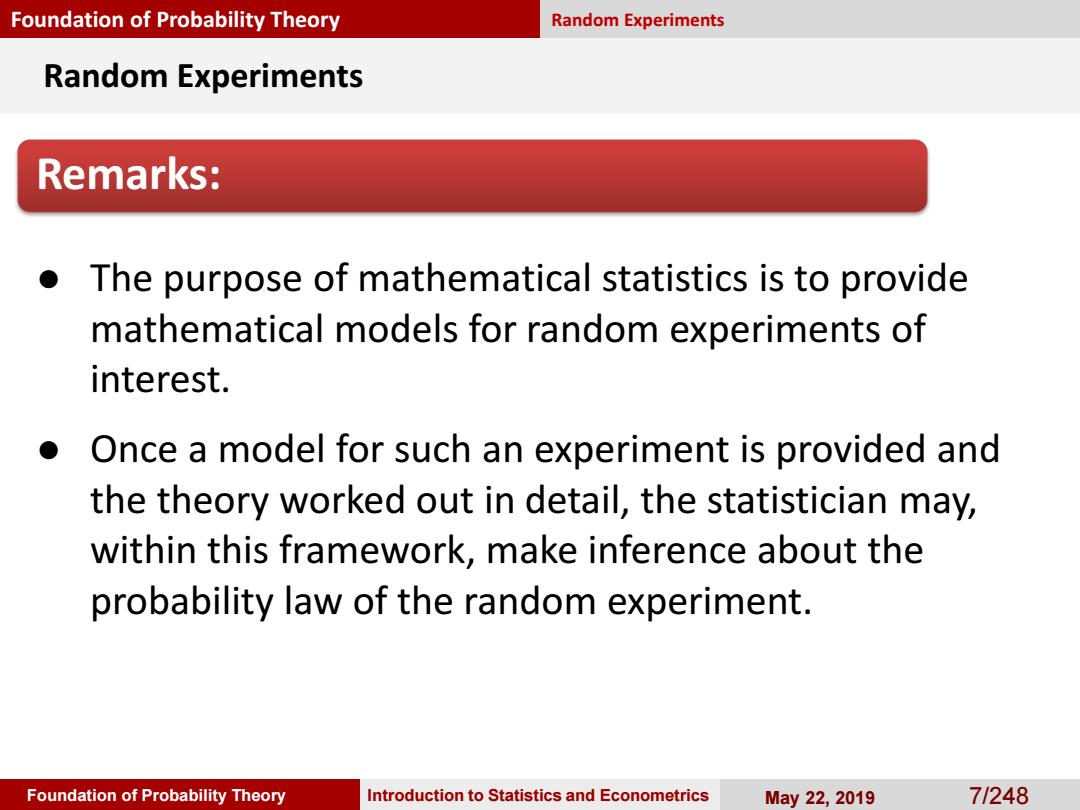
Foundation of Probability Theory Random Experiments Random Experiments Remarks: The purpose of mathematical statistics is to provide mathematical models for random experiments of interest. Once a model for such an experiment is provided and the theory worked out in detail,the statistician may, within this framework,make inference about the probability law of the random experiment. Foundation of Probability Theory Introduction to Statistics and Econometrics May22,2019 7/248
Foundation of Probability Theory Introduction to Statistics and Econometrics May 22, 2019 7/248 Remarks: ● The purpose of mathematical statistics is to provide mathematical models for random experiments of interest. ● Once a model for such an experiment is provided and the theory worked out in detail, the statistician may, within this framework, make inference about the probability law of the random experiment. Random Experiments Foundation of Probability Theory Random Experiments

CONTENTS 2.1 Random Experiments 2.2 Basic Concepts of Probability 2.3 Review of Set Theory 2.4 Fundamental Probability Laws 2.5 Methods of Counting 2.6 Conditional Probability 2.7 Bayes'Theorem 2.8 Independence 2.9 Conclusion Foundation of Probability Theory Introduction to Statistics and Econometrics May22,2019 8/248
Foundation of Probability Theory Introduction to Statistics and Econometrics May 22, 2019 8/248 2.1 Random Experiments 2.2 Basic Concepts of Probability 2.3 Review of Set Theory 2.4 Fundamental Probability Laws 2.5 Methods of Counting 2.6 Conditional Probability 2.7 Bayes' Theorem 2.8 Independence 2.9 Conclusion CONTENTS

Foundation of Probability Theory Basic Concepts of Probability Basic Concepts of Probability Definition 2.Sample Space The possible outcomes of a random experiment are called "basic outcomes",and the set of all basic outcomes constitutes "the sample space",which is denoted by S. Flipping a Coin Rolling a Six Sided Dice Spinning a 4 color spinner Rolling a Weighted Dice 6 red yellow 545 6 blue green 6 SAMPLE SPACE SAMPLE SPACE SAMPLE SPACE SAMPLE SPACE Head,Tail} {1,2,3,4,5,6} (Red,Yellow,Green,Blue} {4,5,6 Uniform Uniform Uniform Not Uniform Foundation of Probability Theory Introduction to Statistics and Econometrics May22,2019 9/248
Foundation of Probability Theory Introduction to Statistics and Econometrics May 22, 2019 9/248 Basic Concepts of Probability Foundation of Probability Theory Basic Concepts of Probability Definition 2. [ Sample Space ] The possible outcomes of a random experiment are called "basic outcomes", and the set of all basic outcomes constitutes "the sample space", which is denoted by S

Foundation of Probability Theory Basic Concepts of Probability Basic Concepts of Probability When an experiment is performed,the realization of the experiment will be one (and only one)outcome in the sample space. If the experiment is performed a number of times,a different outcome may occur each time or some outcomes may repeat. Foundation of Probability Theory Introduction to Statistics and Econometrics May22,2019 10/248
Foundation of Probability Theory Introduction to Statistics and Econometrics May 22, 2019 10/248 Basic Concepts of Probability Foundation of Probability Theory Basic Concepts of Probability ● When an experiment is performed, the realization of the experiment will be one (and only one) outcome in the sample space. ● If the experiment is performed a number of times, a different outcome may occur each time or some outcomes may repeat